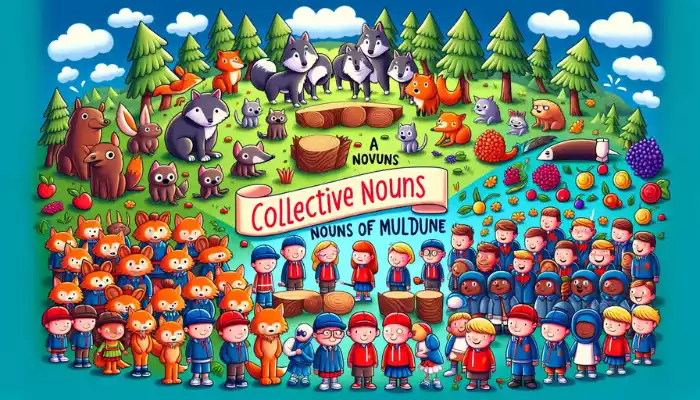Collective Noun vs Noun of Multitude: Have you ever wondered why we say “a flock of birds” but also “a crowd of people”? Both sound like they’re talking about groups, right? Well, in the fascinating world of English, there are special types of nouns that help us talk about groups of things or people. These are called Collective Nouns and Nouns of Multitude. Let’s dive into their differences and make learning about them as fun as a game!
Collective Nouns
Collective Nouns refer to a group of individuals or things as one whole unit. Think of them as a way of bundling up several things into one neat package!
- A pack of wolves: Here, ‘pack’ is the collective noun. It doesn’t matter if there are 3 wolves or 30; they are all referred to as one ‘pack’.
- A bunch of grapes: Similarly, ‘bunch’ is the collective noun for grapes. Whether it’s 10 grapes or 100, they’re all one ‘bunch’.
- A fleet of ships: ‘Fleet’ is the collective noun here, grouping several ships together as one entity.
Nouns of Multitude
Nouns of Multitude, on the other hand, refer to a group where individual members are still significant. This type of noun can be singular or plural based on the context.
- A team: This is a noun of multitude. When we say ‘The team is playing well’, we treat the team as a single unit. But we can also say ‘The team are arguing among themselves’, focusing on the individuals.
- A choir: This works the same way. ‘The choir is singing’ (singular) versus ‘The choir are taking their seats’ (plural).
- A class: When talking about students, ‘The class is learning about history’ treats the class as one unit. But ‘The class are working on different projects’ highlights their individual actions.
Collective Noun vs Noun of Multitude
| Area | Collective Noun | Noun of Multitude |
|---|---|---|
| Definition | A single word that refers to a group as one single, combined entity or whole. | A noun that refers to a group as a collection of distinct individual members. |
| Views Group As | Unified whole or body | Collection of separate entities |
| Typical Examples | Team, jury, family, government, fleet, audience, faculty | People, group, crowd, herd, flock, cast, majority |
| Verb Agreement | Always takes a singular verb form to match the singular sense of the collective group. | Always takes a plural verb form to match plurality and individuality within the group. |
| Sentence Examples with Verbs | The team trains every morning before school. The large family rarely argues during the holidays. | The large crowd were waving different signs during the protest. The people disagree about the new policies. |
| Reason for Verb Agreement | The focus is on the collective group as one single body or whole. So it uses singular verbs just like other singular nouns. | The focus is on all the individual people or things within the group. So it uses plural verbs just like regular plural nouns describing separate entities. |
| Usage Context | Used when the intention is to stress unity, shared identity, similarity, and cohesion within the group. Often used in formal contexts or to imply group coordination. | Used when the intention is to highlight the distinct individuality, diversity, autonomy, differences, and variety within the group. Often used in casual ways or to separate group members. |
| Rhetorical Effects | Can represent power structures, hierarchies, many as one. Elevates status of the collective group due to singular form. |
Can undermine group coherence or power structures by focusing on disparate identities. Diminishes unified status by treating as just a loosely defined collection. |
Conclusion
So, intrepid word explorers, now you know the difference! Collective Nouns are like a single box holding a group, while Nouns of Multitudes are like a basket where you can still see each item inside. Both are incredibly useful in English and make our language richer and more colourful. Keep exploring and discovering the wonders of words!
collective nouns and nouns of multitude depending on whether they wish to stress unified group identity or distinct individuality of members in that situation. Context guides which approach makes more sense.
These modern interpretations captivate audiences. They offer fresh insights into age-old tales. Bhoot Ki Kahani continues to evolve, engaging new generations.

